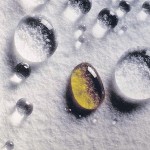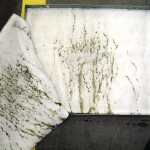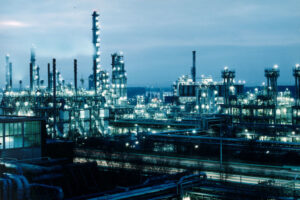During filter separation of water, oils, emulsions and aerosols, stainless steel and synthetic fibre-fleece filter media tend to become clogged quickly with these liquids. In addition to a shorter service life owing to restrictions in functionality, the resulting pressure increase leads to higher power consumption. GEA Delbag Lotex filter media that repel oil and water offer a solution to this dilemma.
The author: Uwe Taeger Freelance writer
Whenever liquids, oils and emulsions are separated, demister and filter systems enable high dehumidification rates in gaseous media such as air or process gases. With metal-cutting and welding machines, for example, oil and water emulsions – as well as vapours – are initially separated by coarse filters, then subjected to further filtration. This coarse filtration protects the more sophisticated filtration stages located downstream.
In such applications, conventional dust filters clog quickly, for instance due to residual oil emulsions or drying. Sooner or later, the filters therefore become increasingly impermeable. In addition, such filters are never one hundred percent capable of removing all oil particles. This leads to a drastic reduction in the lifecycle of the finer filter stages.
Owing to the gradually clogging filter media and the increasing pressure drop, the energy efficiency of conventional filter materials is by no means optimal. Once the filter begins to clog, more energy is required to overcome its resistance. On the other hand, if the operator wishes to keep power consumption low by assuring a low pressure drop, it is necessary to clean or exchange the filter media frequently.
Efficiency thanks to the beading effect
Filter experts at GEA Air Treatment in Herne, Germany, have found a solution here and developed a filter medium offering continuous, liquid-repellent protection: GEA Delbag Lotex. This novel fleece consists of randomly structured, non-breaking polyester fibres with progressive depth configuration and increasing density towards the clean-air side. Thanks to their unique surface structure, the fibres demonstrate oleophobic and hydrophobic properties, so that a beading effect is produced on the filter material. The benefit: oil and other liquids bead off the surfaces (referred to as the lotus effect) instead of collecting in the filter medium. For this reason, separated liquids run off the fibre surfaces significantly faster than with the demister filters featuring stainless steel and synthetic fibre structures that are typically used to separate oil and emulsion mist.
Less pressure due to faster run-off
Fleece made of GEA Delbag Lotex results in a pressure drop that is only a third or half that of conventional demister filters. When demister filters are wetted with liquid aerosols, the aerosols are separated; the fibres become moist and the liquid runs slowly down the fibres. Du-ring this run-off, a large share of the liquid evaporates and the liquid aerosols – which were originally separated from the air – become gaseous again and are re-released. At the same time, the poorly volatile components remain on the fibres and clog the fleece filter media, leading to an increase in the pressure drop. With Delbag LoTex filter pads, this effect is minimised by the fast run-off, with only short dwell times on the filter medium. This has a direct impact not only on the overall degree of separation but also on power consumption.
With regard to energy efficiency, the new medium offers a number of advantages compared to the filter systems traditionally used in the separation of liquid aerosols. On the one hand, the amount of separated liquids is significantly increased while on the other, there is a reduced concentration of vapour on the clean-air side. Furthermore, pressure loss during the filter lifecycle takes place at a low level. The correspondingly longer service intervals for the coarse and fine filter stages equate to a substantial reduction in operating expenses.
Hall 5, Booth 250
Online-Info: www.cpp-net.com/0311415
Energy savings at a glance
Advantages
The GEA Delbag LoTex technology offers a number of advantages compared to the filter systems traditionally used in the separation of liquid aerosols:
- Greater energy efficiency: Up to 50 % potential energy saving due to the significantly lower pressure losses with a similar degree of separation
- Reduction in CO2 emissions: As a result of the lower power consumption, up to 50 % less carbon dioxide is released during power generation
- Minimised gaseous phase: The short dwell time of the separated liquid aerosols minimises the amount of aerosols released back into the clean air by evaporation
- Longer service life: Faster liquid run-off with fewer hardening residues on the filter medium extend the medium’s lifecycle
Share:








